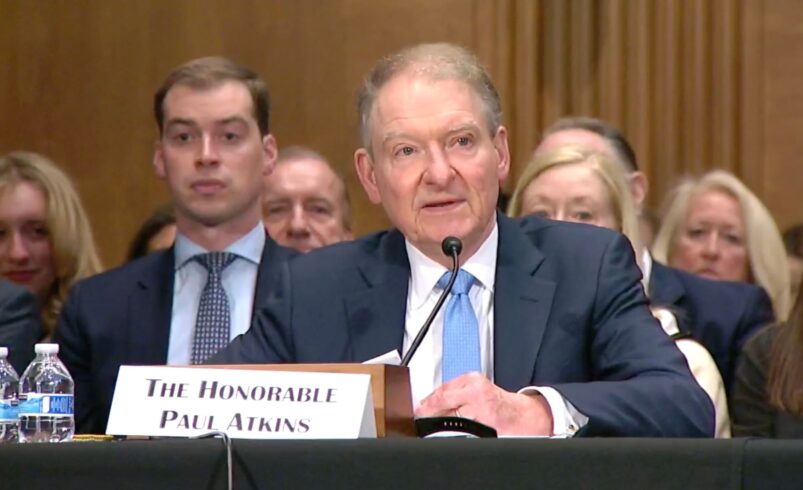SEC Delays Decisions on Ether ETF Staking and In-Kind Redemptions
- April 15, 2025
- 0
Discover the SEC's recent delays on Ether ETF staking and in-kind redemptions. Learn how these decisions could shape the future of cryptocurrency investments.
Discover the SEC's recent delays on Ether ETF staking and in-kind redemptions. Learn how these decisions could shape the future of cryptocurrency investments.

Have you ever wondered how regulatory decisions can shape the future of cryptocurrency markets?
The recent announcements from the U.S. Securities and Exchange Commission (SEC) have certainly generated discussion among investors and experts in the crypto space. The SEC’s delays regarding crucial features for cryptocurrency exchange-traded funds (ETFs) have left many speculating about the broader impacts on the market. He knew that understanding these delays was vital for any investor looking to navigate the ever-evolving landscape of cryptocurrency.
The SEC has officially put off two significant decisions that involve in-kind redemptions and the potential for staking features in Ethereum ETFs. This indecision has raised eyebrows, especially as other jurisdictions around the world have given the green light for similar features.
It is apparent that the SEC is taking a more cautious approach, perhaps to assess potential risks and regulatory implications. Understanding these delays will help investors gauge how the crypto market might evolve in the coming months.
In-kind redemptions are a mechanism traditionally used in mutual funds and ETFs that allow investors to withdraw shares of the underlying assets instead of cash. For cryptocurrency ETFs like those proposed by Bitwise and WisdomTree, in-kind redemptions would mean that investors could take their Ethereum directly rather than cash payouts that might influence market price.
Investors often find in-kind redemptions appealing because they can manage tax liabilities more effectively. In the case of crypto, where the tax landscape is still evolving, this feature holds particular significance.
Staking is a process in blockchain technology that allows individuals to participate in the network’s operations by holding and locking up an amount of cryptocurrency. Instead of mining, staking allows holders to earn rewards simply by staking their coins. Grayscale’s proposal for its Ethereum Trust includes staking, which could provide investors with ongoing income from their holdings.
The SEC’s decision to postpone the ruling on staking could have substantial implications for both Grayscale and its investors. Incorporating staking into an ETF could make the product more enticing and potentially increase its adoption.
The SEC has set new target dates for these decisions in early June 2025. Specifically, June 1 has emerged as a crucial date for Grayscale’s staking proposal, while June 3 is the deadline for the in-kind redemption proposals from Bitwise and WisdomTree.
These deadlines highlight how the SEC operates differently from other global regulatory bodies, prompting a question about the potential for harmonization or at least alignment among various jurisdictions.

As the SEC hesitates, other regions have embraced cryptocurrency innovations with relative ease. Countries like Hong Kong, Canada, and several European nations have already approved staking within their ETF frameworks.
This divergence prompts questions about the SEC’s regulatory approach and whether they might feel the pressure to adapt.
While investors watch other jurisdictions adopt innovative features like staking, the SEC remains focused on thorough evaluations, which some experts see as a cautionary tale rather than an impediment. James Seyffart, an analyst at Bloomberg Intelligence, points out that the SEC often moves at its own pace, unaffected by the regulatory rhythms of other countries.
The persistent caution signals the SEC’s effort to safeguard investors and ensure that any newfound product characteristics do not introduce unforeseen risks to an already volatile market.
Investors must remain attentive to any updates from the SEC concerning these rulings. The impact of staking and in-kind redemptions on crypto ETFs could influence the overall acceptance of cryptocurrencies in mainstream finance. Should the SEC approve these features, it would mark a significant shift. Conversely, prolonged delays or outright rejections may deter institutional investment and spark more uncertainty.
For many investors, these decisions could shape their strategies. As they wait for clarity, he encourages them to consider their time horizon and risk tolerance carefully.

Despite the uncertainties thrown by the SEC’s delays, it is essential for investors to stay informed. The crypto market is not just about immediate price movements; it is about understanding the mechanisms behind how assets are traded and managed.
Investors may wish to monitor discussions surrounding regulatory updates as they can foretell changes in market structure. Specifically:
The SEC’s decisions will undoubtedly impact investment strategies going forward. Understood clearly, he recognized that the regulatory environment could either open up or restrict opportunities. Those who prioritize clarity and safety would view the delays as an incentive to exercise patience.
Additionally, with the knowledge that the SEC is looking into the inherent risks and complexities of crypto ETFs, investors might reassess their portfolios accordingly. Understanding the potential for staking could potentially lead to better financial decision-making as they ponder their next steps.

As June 2025 approaches, all eyes will be on the SEC. The decisions made around in-kind redemptions and staking will likely be scrutinized not only for their direct implications but also for what they might indicate about future regulatory stances.
Sitting back and waiting can be challenging, especially in the fast-paced world of cryptocurrency. Investors should view this as a time to research and gather knowledge. Understanding the nuances of their investments provides a more solid footing upon which to base decisions.
As the market gears up for potential rulings, it may be advantageous for investors to ready their strategies for various scenarios. Should the SEC approve in-kind redemptions and staking, they might capitalize on the new opportunities that arise. Conversely, if the decisions result in further scrutiny or limitations, a more conservative approach may be warranted.
Investors may consider engaging with thought leaders within the space, reading analyses from various experts to understand differing viewpoints. As these decisions unfold, remaining open to diverse perspectives will enrich their decision-making process.

In conclusion, the SEC’s recent delays on in-kind redemptions and staking within Ether ETFs shine a light on the ongoing regulatory scrutiny surrounding cryptocurrency. As he reflects on the implications of these decisions, it’s clear that regulatory measures can either hinder or facilitate market growth.
Ultimately, as time passes toward the June deadlines, it is essential for investors to remain aware of the shifting landscape. Decisions made today can have a profound impact on the market tomorrow, and being prepared can offer a significant advantage.
The conversations around these regulatory decisions will likely evolve, and investors must be agile, informed, and interested. By doing so, they can navigate this complex environment with greater confidence and clarity.



